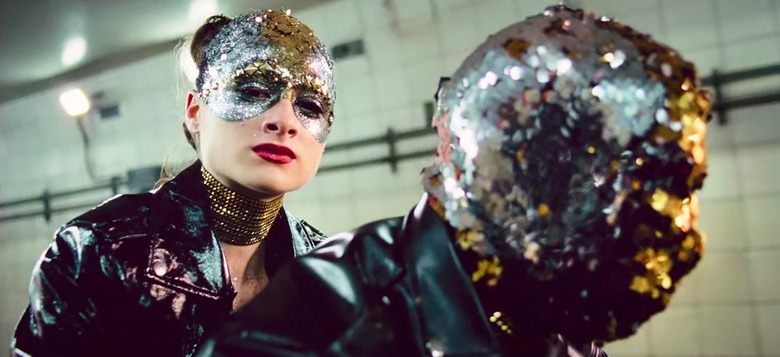Movie Mixtape: 6 Movies To Watch With 'Vox Lux'
Cinema often treats tragedy either as an incubator for profound goodness or for unspeakable monstrosity, recognizing that cataclysmic change – no matter the flavor – is inescapable when the worst happens. For the two young women at the center of Vox Lux, it's both.
But silver linings can turn out to be tin foil, especially when seen through the starry-eyed glasses of fame. Celeste (Natalie Portman) and Ellie (Stacy Martin) survive a childhood nightmare and convert it into a song. The song lands them both an eager manager (Jude Law) and a ticket on the rocket ship of celebrity.
The film by writer/director Brady Corbet growls with a message about the intertwining notions of televised fame and terrorism and hums with original songs from Sia. That it comes out the same year as a version of A Star in Born starring Lady Gaga is cosmic coincidence that needs to be revisited once both are available outside theaters.
Fortunately, there are several other golden voiced, grim views of success to watch with Vox Lux.
Black Swan (2010)
Darren Aronofsky's flip side to The Wrestler explored the ways in which an artist seeking perfection affects a piece of art while the art affects her. Eight years ago, Portman played the ingenue looking to develop a sexual edge, while in Vox Lux, she's now the powerful pop diva chewing through the world around her at will.
Portman and the dark side of fame are obvious links, but both films also wrestle with the high price of dedication to an artistic ideal, to a life far removed from how most people live, and to owning a feverishly hot spotlight.
Popstar: Never Stop Never Stopping (2016)
The egomania and arrested development are just as easy to spot in The Lonely Island's semi-autobiographical mockumentary even though it's on the other side of the tonal spectrum.
Don't pretend you didn't think deeply about it, either. The vacuousness of one celebrity revealing the absurdity at the core of who we choose to bestow an insane amount of attention to. The impenetrability of a grown child navigating a crowd of millions inside a protected bubble. The lameness of a big house with no friends to fill it because wolves you rented maimed Seal.
Andrei Rublev (1966)
It's really, really difficult to make a bell.
Andrei Tarkosvky's anti-biopic uses the most famous icon painter of 15th century Russia to give us the breathing room to ruminate on our own lives and the beauty we may be missing as we walk through the field with our eyes down. As much as it's about art, it's also about creating during a time of violence, raising the specter of the fragility and futility of painting (or singing or telling jokes that get you arrested) during war. Naturally, it also makes the point of how necessary those things are at just that time.
Split into 7 chapters, it's an epic crafted from Rublev's encounters with his fellow monks, naked pagans, and his impoverished nation. He spends a significant amount of time in his own biopic as a spectator, watching events play out – a signal that no one, not even the most important people in history, should always be at the center of the story.
Return to Oz (1985)
An average young girl is whisked away to a land of possibilities where she's viewed as royalty for bringing communities together. Beyond the glitz and splendor of the universe that's so far away from home lies treachery, murderous dark forces, and a witch who can pull her own head off.
Return to Oz is the horror version of the 1939 classic where Judy Garland is rewarded for murdering two people with a hot air balloon ride. Walter Murch's entry eschews the singing for a phantasmagoria of joy and horror.
Synecdoche, NY (2008)
A theater director (Philip Seymour Hoffman) endures the mother of all mid-life crises when he stages a recreation of his city and granular life chasing what's "real." Charlie Kaufman's directorial debut swirls a dozen bigthink themes in its head as layer upon absurdist layer congeals over Hoffman's creation.
That includes the immortality we chase by creating and the worship we offer those flawed, ego-driven creators who would need to fill a void with something so large.
Amy (2015)
The first movie that came to mind. The parallels of the pain aren't the same, but there's no better cipher for how fame can be like winning the lottery than Amy Winehouse. A destructive freedom comes with so many eyes on you.
Asif Kapadia's documentary is a masterwork of non-fiction that refuses to accept the popular, flattened image of the soul singer who achieved groundbreaking global success in her early 20s. With any portrait of celebrity, we're confronted with the choice to accept the easy, untrue version that lets us fantasize that we know them or recognize the human complexity of someone we've professionally boiled down into a singular idea.
The Mix
It's enough that we recognize our view of celebrity is profoundly flawed, and movies are part of that problem. Cinema wants to paint fame either as a golden ticket to aspire to (think the Teflon nonsense of Entourage) or a traumatic life sentence with a fatally high price of admission (think Starry Eyes or Birdman or Sunset Blvd). Most movies aren't equipped to illustrate the gray shades, especially since we come to the theater with built-in expectations about what celebrity is supposed to be like, and we want those suspicions confirmed.
We want to be reassured that fame is the dream or the nightmare we believe it to be.
What are you double featuring with Vox Lux?

